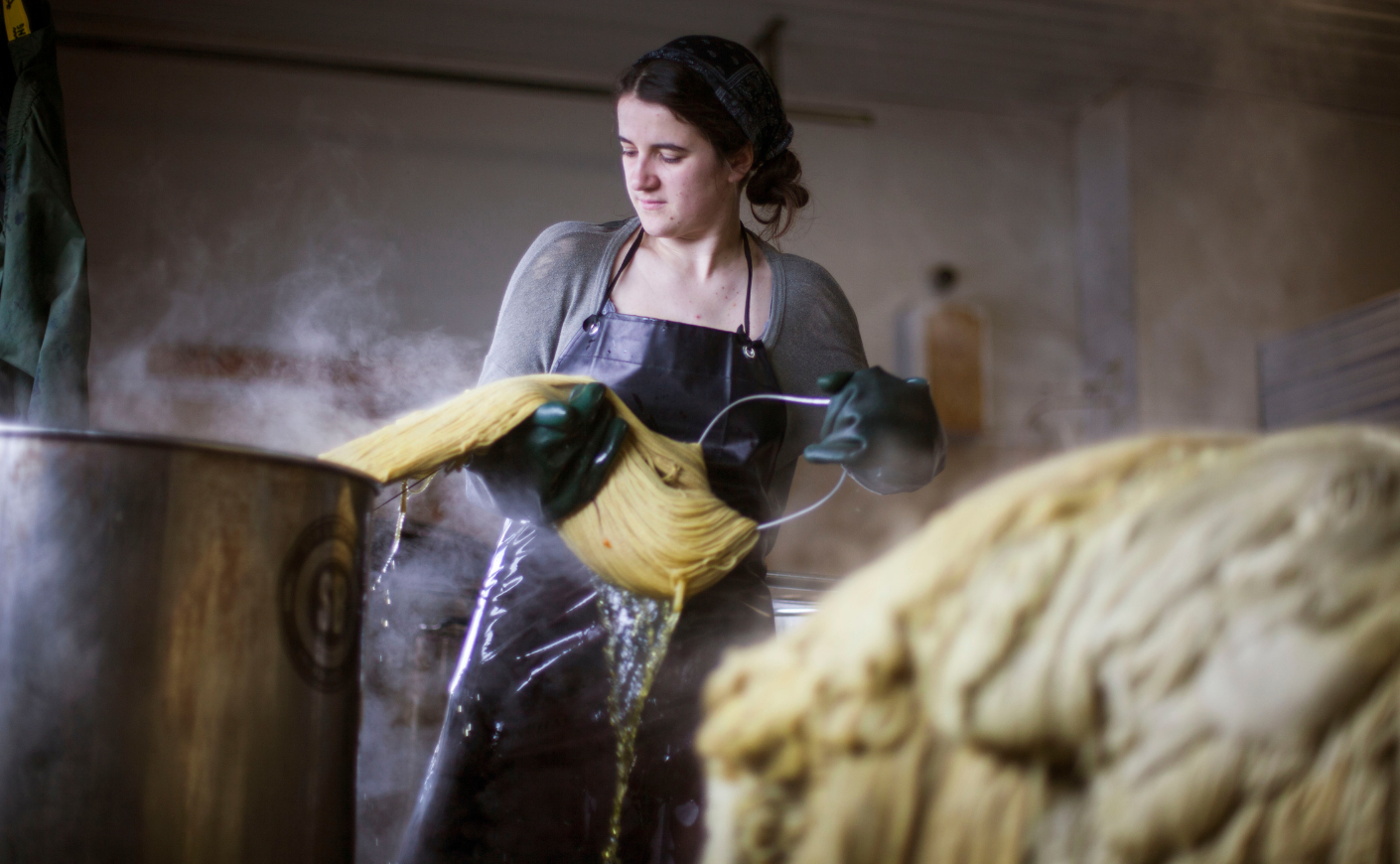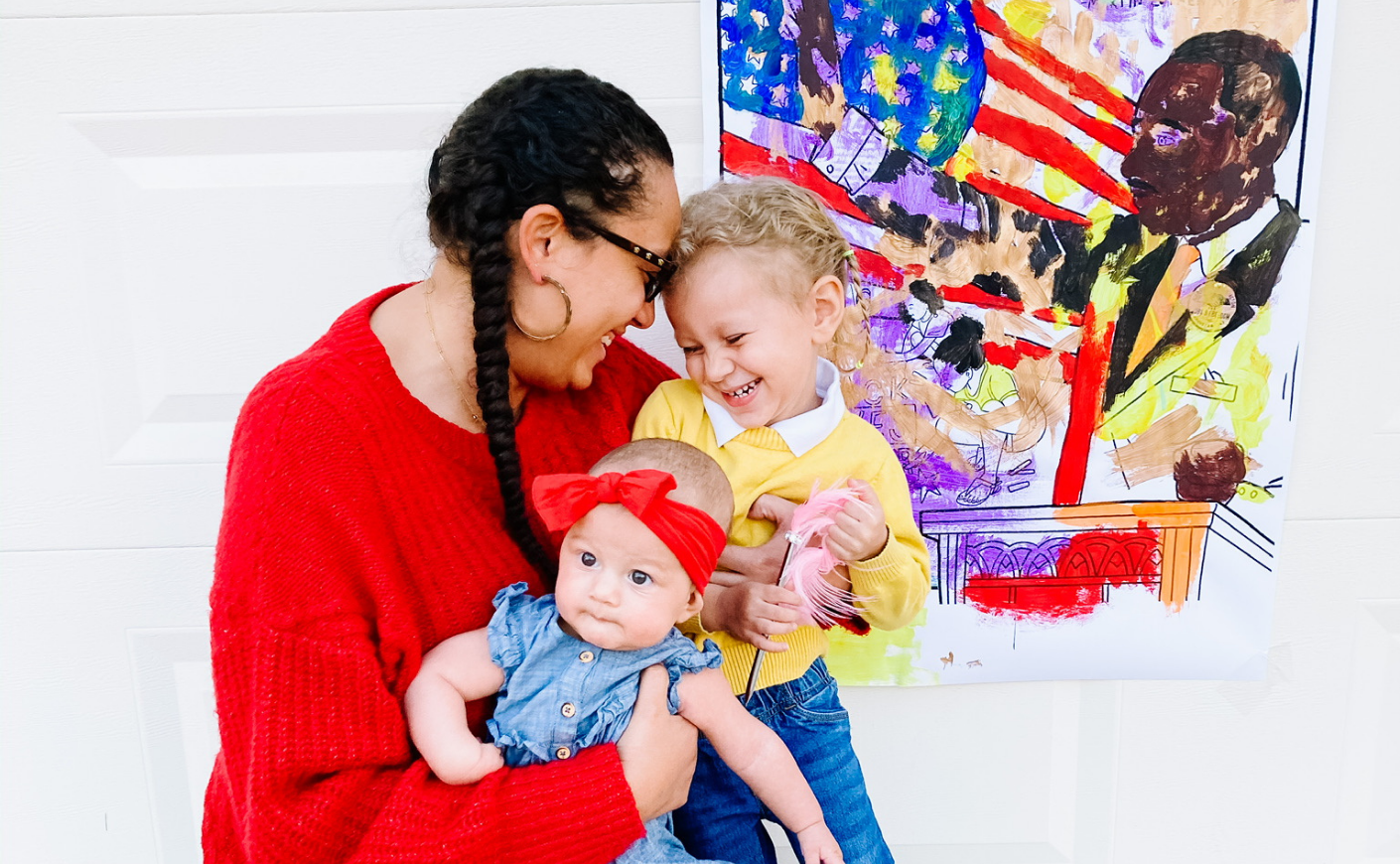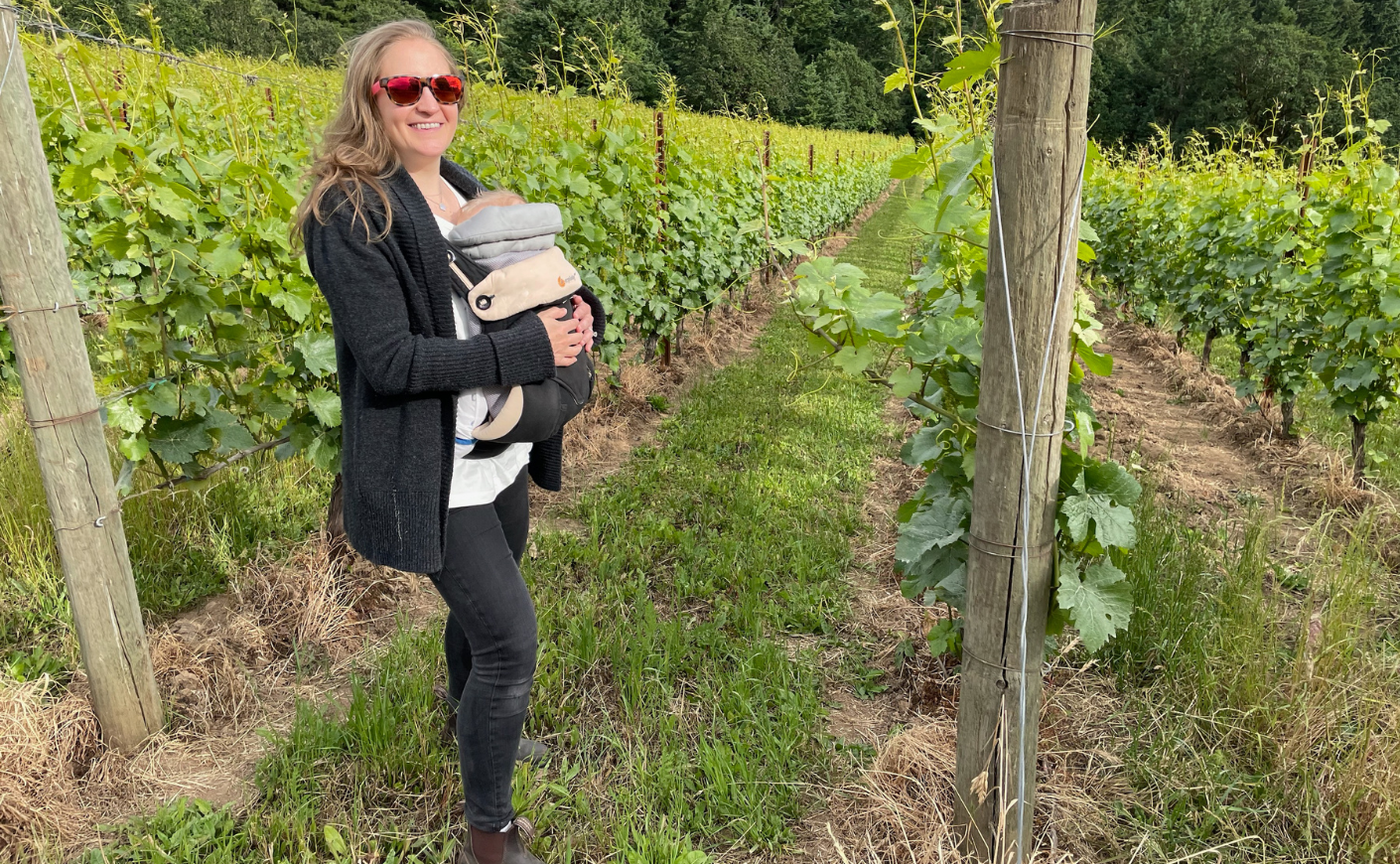It’s comforting to know there are entrepreneurs in the world dedicated to improving the future of our kids, grandkids, and their kids’ lives. And the three female founders below are doing exactly that. Each is asking, How can my company create a better world for all of us? We think their amazing work deserves a spotlight (and a round of applause).
From establishing a more sustainable way to dye clothes, to teaching parents and caregivers how to talk to their kids about race, to ensuring females are top of mind when new pharmaceutical drugs go to market, these women are industry disruptors. To borrow a phrase from Louis Armstrong, they’re cultivating a more “wonderful world.”
Below, get to know how these companies — and the fearless founders behind them — are forging a path for a brighter future.
She’s making a more sustainable fashion industry by turning wasted materials into garment dyes

After a tragic garment factory collapse in Bangladesh in 2013, fashion designer Winona Quigley had a wake-up call about how her pieces were made. “I understood that the cutting and sewing were not the only stages of garment production that were harming workers and the environment, but that most parts of the fashion supply chain were taking advantage of both people and the planet,” says Quigley.
So she set out on a mission to produce plant-based and natural dyes (instead of commonly used toxic ones) for garments, and co-founded the Green Matters Natural Dye Company in her hometown of Lancaster, P.A. The company’s headquarters is located on a converted dairy farm “which allows us to capture and store rainwater in a cistern under the dye house, which we use for all of our dyeing,” Quigley says.
Recognized on Forbes magazine’s “30 Under 30 list” last year, Quigley’s method for crafting natural dyes has disrupted the fashion industry’s status quo. “We’re the only industrial dye house that exclusively uses plant-based dyes, so being one-of-a kind feels a bit disruptive,” she says. “Early on, multiple people told us it wasn't possible.”
Quigley was also recognized as one of Ally’s Daring to Disrupt contest winners for her commitment to moving the sustainability needle forward in the fashion industry. And it’s helped drive her business forward. “We used the prize money to invest in sales. The small investment has already paid off and has allowed us to hire a team member who focuses on sales full-time,” she says.
Not only is Green Matters making an impact on the clothing-dye industry, they’re also adding new manufacturing jobs for women, an industry that predominantly employs men. “Our team is comprised entirely of people who identify as women or non-binary, which we hope sets a standard for other manufacturers,” says Quigley.
What’s next for the company? Quigley wants to share more behind-the-scenes stories with her community on how Green Matters works. She hopes that’ll inspire more conversation around increasing sustainable practices in the fashion industry. And they’re also continuously looking for new waste materials that can be used for dye: “We already use avocado pits from restaurants as a dye source,” says Quigley, “best represented by our work with Chipotle Mexican Grill on their line Chipotle Goods.”
What’s Quigley’s hope for future generations? “I hope that we are planting the seed for more manufacturing jobs in the U.S. (particularly for women),” she says. “I also hope that if the fashion industry has vendors who can produce garments in sustainable ways, future generations won’t have to feel as much impact on the environment.”
She’s on a mission to help parents and caregivers teach their kids how to be anti-racist

Jasmine Bradshaw launched her podcast First Name Basis after realizing there was a lack of resources for parents on how to teach their kids about race — and more specifically, how to be anti-racist. As a former second-grade teacher, Bradshaw knew how to educate students on the importance of inclusivity, but once she had her daughter, she wondered how to approach the topic as a parent.
“I started doing a ton of research and I’d share it on my Instagram,” she says. “A ton of people started asking me the same kinds of questions, ‘What do I say to my kids about racism? How do I explain skin color?’ I realized there needs to be a place where people can just press play and get the answer at their fingertips in one spot.” Most of her podcast episodes focus on an important and often-asked question, like, “Can We Talk About White Privilege?” or “What About Black on Black Crime?” And she spends up to 10 hours collecting personal stories and data to build on her answers.
Through her podcast, Bradshaw has cultivated a community of like-minded parents all across the world who are looking for ways to teach their kids how to be more inclusive. Last fall, she launched an online video series called Ally Elementary* which starts with the basics of explaining melanin, then goes through every step along the way toward how to be an anti-racist kid — a vital, and more proactive term, versus identifying as “not racist.” Says Bradshaw, “Being not racist means that you think that racism is bad, and you don't agree with it. It's very passive. But being anti-racist means that you understand that race is a systemic issue that affects everybody. So, if it's a problem that we're all facing, it means that you have a responsibility to try to help.” The Ally Elementary program is helping children be more active in their communities, and the feedback from parents motivates Bradshaw to continue creating these resources.
One fourth-grader who watched the video series took matters into her own hands. “She noticed her school didn’t have super diverse books,” says Bradshaw. “So, she set up a lemonade stand to raise money to buy some and the word spread like wildfire.” The young student ended up raising enough money to buy a set of inclusive books for every school in her Utah school district. “Her mom said, ‘That was because you told her to go help,’” says Bradshaw. “I just cannot believe it. It’s one of those stories where I ask, Is this my real life?”
Bradshaw’s intentional about opening up the race conversation with kids for a reason. “I hear a lot of parents say, ‘Our kids are going to change the world,’ and what I want them to understand is that’s true if you give them the tools and model that. They can't change something that they don't even know is an issue, or that they don't know how to tackle,” says Bradshaw.
Being a part of Ally’s Daring to Disrupt contest last year helped Bradshaw realize her work was making an impact — and she was able to hire two new team members. “They’ve propelled my business in ways that I would’ve never imagined,” she says. “We’re producing things that I’m so proud of.”
At her core, Bradshaw believes creating a more equitable future starts inside the home. “When it comes to race, people don't want to mess up — they’re scared,” she says. “What I want people to know is that as long as you're making progress and taking steps forward, your effort is recognized and appreciated.” Of course, she acknowledges that people may still make mistakes along the way. “Making mistakes is part of it,” says Bradshaw. “But when you try, it’s a huge deal.”
She’s on her way towards creating a first-of-its-kind female-first pharmaceutical company

Lauren Cappell didn’t wake up one morning and decide to start a biotech company. Though she works in healthcare, that wasn’t her lifelong dream. But during the pandemic, that all changed when she started chatting with a childhood friend, Dr. Galit Alter, who is a professor at Harvard Medical School. Together, they had exploratory discussions about their respective skill sets and how they could use them to start a business together.
“At one point I said to her, ‘Why do I keep seeing articles about females suffering more, or responding differently, to Covid vaccines, or that they experience Covid differently?’” says Cappell. That’s when her friend, and now co-founder of their company, The Stronger Sex, explained that males and females have different immune systems. And that historically, drugs and vaccines have been designed for the male immune system.
For Cappell, a lightbulb went off. “That got me thinking — could we actually design better drugs and vaccines tailored for the female immune system? We believe that we can,” says Cappell.
“Most drugs in-market today are primarily tested on male animals and male patients, even though females have a different immunology, express different types and levels of immune cells, and have different levels of inflammatory responses to certain triggers,” says Cappell. “The result is that a lot of immune-based treatments are less effective in females, don't last as long, and there are more adverse effects.”
While Cappell is in the initial research phase, she recognizes the triumphs of the past — and the need to change the future. “The reality is the pharma industry has brought to market amazing, life-saving, world-altering therapeutics driven by incredible scientific breakthroughs,” she says. “And all we're trying to do here is build on those amazing breakthroughs.”
Understanding there’s a long road ahead, (“This is going to be like pushing a boulder up the biggest hill you can imagine,” she says), Cappell is undaunted. “What we're going after is a world where females are better empowered to protect themselves from autoimmune disorders, cancers, and infectious diseases,” she says. Cappell hopes her company will open other people’s eyes up to a different way of developing drugs: “The goal of the company overall is to create this new female-first category of monoclonal therapeutics and to act as leaders in this new field of precision sex design,” she says.
For Cappell, being recognized as one of Ally’s Daring to Disrupt contest winners gave her the momentum she needed to continue on an uphill journey. “It made me realize we’re on to something. And if we don’t do this, somebody else will,” says Cappell.
If Cappell’s hypothesis is correct, The Stronger Sex could reshape the entire pharmaceutical industry. “What we hope is that by demonstrating the potential of our platform, and undertaking this monumental task,” she says, “we can get across the message that we need to start clinical research in certain areas, from the basic premise that males and females have different immune responses.”
Cappell’s current goal? To find an investor who wants to partner with them on this journey — and make it a reality. “Is there a possibility that we won’t be able to produce better clinical outcomes? Sure,” says Cappell. “But there's also the possibility we could produce better clinical outcomes for both sexes, and that would be a great result, too.”
Our friends at Ally are championing the future of inspiring and innovative female entrepreneurs, like Winona, Jasmine, and Lauren, through their Daring to Disrupt platform. Daring to Disrupt showcases the stories of women who are changing industries by challenging the status quo. Want to meet more female disruptors? Starting March 8 (on International Women’s Day!), we’ll be introducing you to eight new passionate women who are breaking glass ceilings and shattering outdated ways of thinking. Stay tuned for more.
*Ally Elementary is not affiliated with Ally.












